You want to stay fit, build strength, or even burn some calories, but the gym doesn’t fit your busy schedule. Feeling stuck?
The good news is you don’t need fancy equipment or a pricey gym membership to achieve your fitness goals. Your bodyweight and home items can be an incredibly effective tool for getting a great workout.
Home workouts remove all the stress. Once you know what you need to do and how easy it is, you can get fit whenever and wherever you want.
Here are 40 of the most effective bodyweight exercises you can do anywhere, anytime. This workout will work all the major muscles according to your fitness level. You can find a routine that works for you and keeps things interesting.
- How To Start The Workout At Home Without Equipment
- Beginner Bodyweight Exercises At Home
- Advance Bodyweight Home Workout
- Resistance Band Home Workouts
- Cardio Home Workout
- Yoga and Pilates at Home
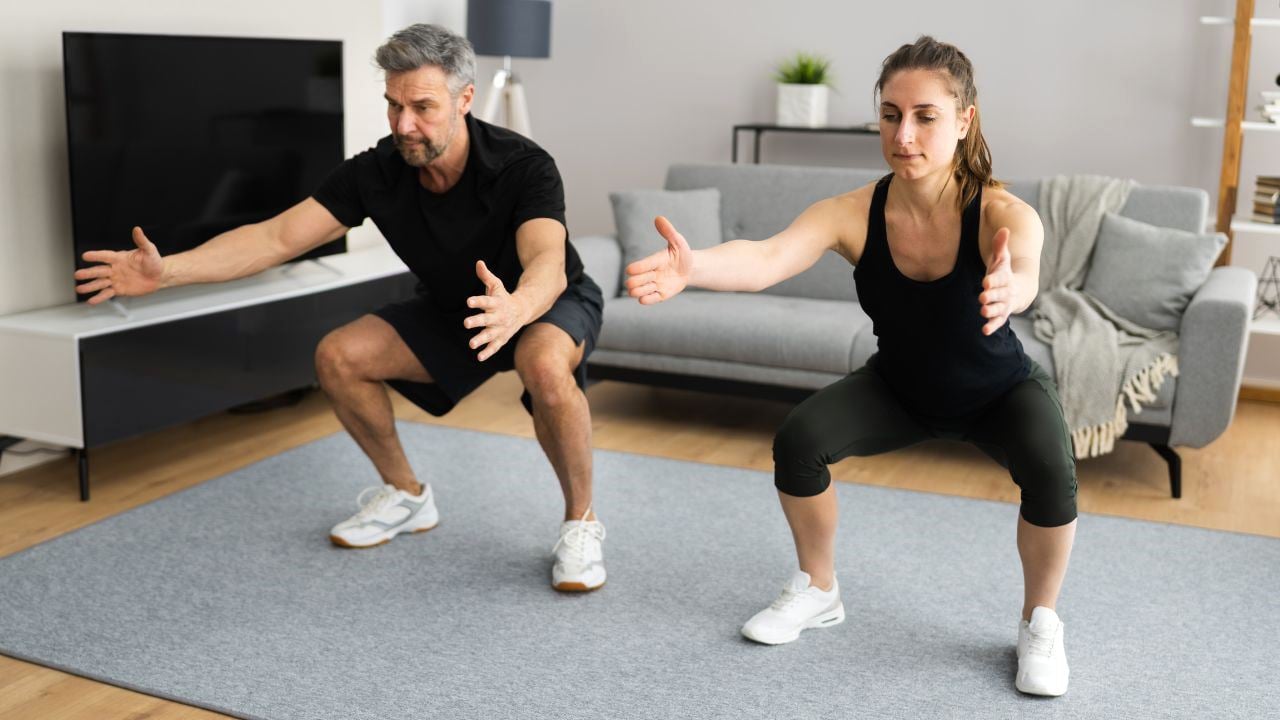
- How To Start The Workout At Home Without Equipment
- 1. Determine Your Goals
- 2. Find Your Perfect Space
- 3. Choose the Everyday Items
- 4. Choose the Right Exercises
- 5. Create a Workout Schedule
- 6. Add Warm up and Cool Down In Your Home Workout Routine
- 7. Monitor your progress And Increase the challenge
- Beginner Bodyweight Exercises At Home
- 1. Wall Push Up
- 2. Knee Push-Up
- 3. Superman
- 4. Bird Dog
- 5. Arm Circles
- 6. Knee Diamond Push-Up
- 7. Bodyweight Bicep Curl
- 8. Step-Ups
- 9. Bodyweight Standing Calf Raise
- 10. Glute Bridges
- 11. Planks
- 12. Russian Twists
- Beginner At-Home Workout Routines
- Advance Bodyweight Workout At Home
- 13. Incline Push-Up
- 14. Standard Push-Ups
- 15. Inverted Row
- 16. Pull-Up
- 17. Shoulder Tap Push Up
- 18. Crab Walk
- 19. Pike Push Up
- 20. Reverse Grip Push-Ups
- 21. Bench Dip
- 22. Bodyweight Squat
- 23. Bodyweight Lunges
- 24. Lying Straight Leg Raise
- 25. V-Up
- Advance Home Workout Routine
- Resistance Band Workouts At Home
- 26. Resistance Band Bicep Curls
- 27. Band Tricep Pushdown
- 28. Resistance Band Leg Extension
- 29. Resistance Band Shoulder Press
- 30. Resistance Band Rows
- Resistance Band Home Workout Routine Plan
- Cardio Workout at Home
- 1. Jumping Jacks
- 2. High Knees
- 3. Mountain Climbers
- 4. Burpees
- 5. Jumping Rope
- Cardio Workout Routine At Home
- Yoga and Pilates Workout Routine at Home
- 1. Downward Facing Dog
- 2. Warrior I
- 3. Child’s pose
- 4. The Hundred
- 5. Single-leg circles
- Yoga and Pilate Home Workout routines
- Takeaways
How To Start The Workout At Home Without Equipment
Here are some tips for getting started with a home workout routine:
1. Determine Your Goals
Knowing what you want to achieve before starting a home workout routine is important.
Do you want to build muscle, lose weight, or improve your fitness? This will help you tailor your workouts to meet your specific goals.
2. Find Your Perfect Space
Most living rooms offer enough space for basic exercises. You can move furniture around to create a designated workout area.
If space is tight, your bedroom can work too. Enjoy good weather and exercise outdoors on your balcony, porch, or backyard.
3. Choose the Everyday Items
You don’t need a lot of fancy equipment to build muscle or lose fat at home, but you’ll want to have some basic items on hand.
Some home items, such as a chair, sofa, resistance band, and yoga mat, are suitable options for starting your workout.
4. Choose the Right Exercises
Many exercises, including bodyweight exercises, resistance band exercises, yoga, and Pilates, can help you build muscle at home.
- Bodyweight exercises, such as push-ups, squats, lunges, and planks. They do not require equipment and can be done anywhere.
- Resistance bands are versatile and portable pieces of equipment. They can be used for various exercises, such as bicep curls, tricep extensions, and lateral walks.
- There are many ways to do cardio workouts at home without equipment, such as jumping jacks, burpees, or running in place. If you can access a stationary bike, treadmill, or stair climber, you can also try using one.
- Pilates practices focus on strength, flexibility, and balance and can be done with minimal equipment, such as a yoga mat or small hand weights.
5. Create a Workout Schedule
To reach your fitness goals, you need to be consistent. Establish a regular workout schedule to stay on track.
Decide how many days per week you will work out and which exercises you will do each day. Start with manageable workout durations and intensity levels.
6. Add Warm up and Cool Down In Your Home Workout Routine
Proper warm-up and cool-down routines are essential to prevent injury and aid recovery.
- Warm-Up: Spend 5–10 minutes doing light cardio, such as arm circles and leg swings, or light cardio, such as jumping jacks or jumping rope, to increase your heart rate and prepare your muscles for exercise.
- Cool Down: After your workout, gently stretch to relax your muscles and improve flexibility.
7. Monitor your progress And Increase the challenge
Keep track of your workouts and make sure to monitor your progress. Also, gradually increase the challenge as you get stronger and more comfortable with your workouts.
You can do that by increasing sets and reps, using a more difficult variation of an exercise, or adding new exercises.
Beginner Bodyweight Exercises At Home
There are many bodyweight exercises that you can do at home to lose fat, build strength, improve cardiovascular fitness, and increase flexibility.
Remember to warm up before you start your workout and cool down afterwards to reduce the risk of injury.
You can also vary the intensity and duration of your workouts to challenge yourself and keep things interesting.
1. Wall Push Up
Wall push up is a simple type of push-up that significantly reduces the pressure on the arms, upper back, and abs. The closer you are to the wall, the easier it will be to perform.
However, it is still important to know your body alignment when performing this chest push-up.
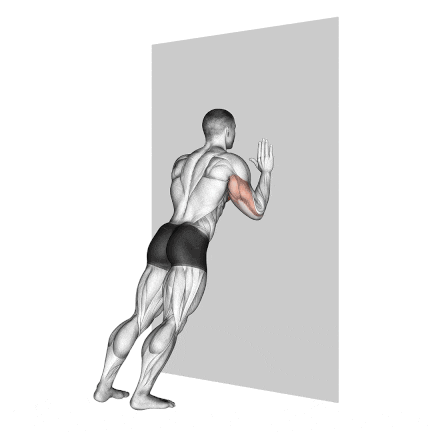
How To Do
- Stand 2 to 2.5 feet away from the wall with your arms in front of you.
- Put your hands against the wall and your legs behind you, so your body makes a triangle with the wall and the floor.
- Keep your feet on the ground and lean forward until your elbows bend and your chest is close to the wall.
- Push your body back into a standing position.
2. Knee Push-Up
Knee push-ups are one of the most effective beginner-friendly upper-body exercises to build functional strength.
Knee push-ups are a good way to start if you have trouble doing the standard push-ups. The exercise reduces the amount of body weight you are lifting.
It is a great way to strengthen your chest muscles and train your shoulders and triceps.
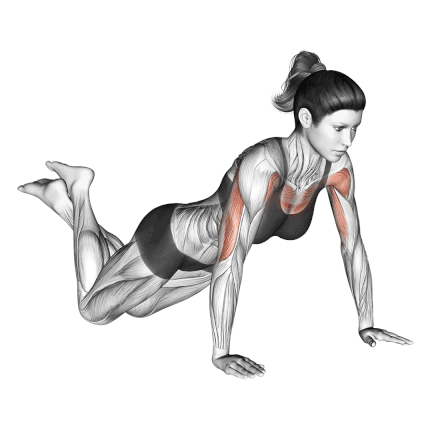
How To Do
- Kneel on the floor. Extend your arms and put your hands shoulder-width apart on the floor in front of you.
- To lower yourself, bend your elbows and make sure your body is straight from your head to your knees.
- Raise your body to the starting position by pushing up with your arms.
3. Superman
It is one of the best back exercises you can do without equipment. If done regularly, the Superman exercise may help relieve back pain caused by weak back muscles. It also works on your glutes and your hamstring muscles.
The superman exercise is convenient, accessible, affordable, and easy to perform for all exercise levels
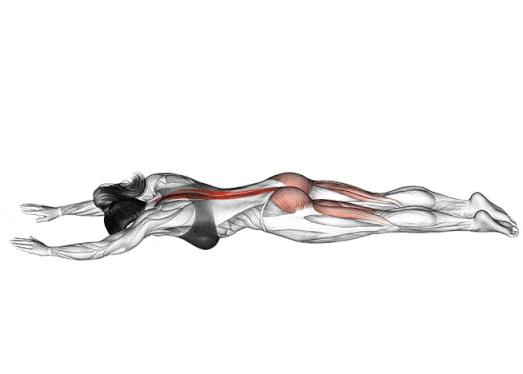
How To Do
- Lie on the ground with your stomach flat on the ground. Extend your arms in front of you, with your palms down.
- Lift your head, raise your arms and chest off the ground as high as possible.
- Bend your legs and lift your thighs off the ground as much as possible. (Try to make a big “U” with your back.)
- You should feel your back muscles, glutes, and hamstrings tighten at this point.
4. Bird Dog
The bird dog exercise looks elegant and is also very effective for training the core and back muscles. It owes its name to the position, alternating between sitting on hands and knees (dog) and stretching the arms and legs (bird).
This exercise is suitable for people of all levels, including older adults. It can prevent injury, align the spine, and recover from low back pain.
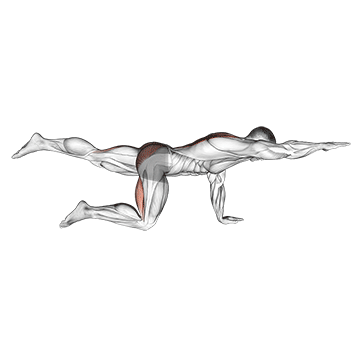
How To Do
- Get on your knees and place your hands on the floor in front of your body at shoulder width.
- Contract your abs and lift one hand and the opposite knee slightly off the floor. You are now balancing on the other hand and knee.
- Now extend your arm and leg all the way out. Try to form a straight plane from your hand to your foot.
- Hold this position for about 10 seconds and then return to the starting position. Repeat the exercise with the other side.
Read More: 15 Best Bodyweight Back Workout: Beginner To Advanced
5. Arm Circles
Arm circles are a great exercise to tone and strengthen your shoulder and arms.
The circular motion of shoulder circles helps stretch and lubricate the shoulder joint and increase your range of motion. This can be particularly helpful for desk workers or those who perform repetitive overhead motions.
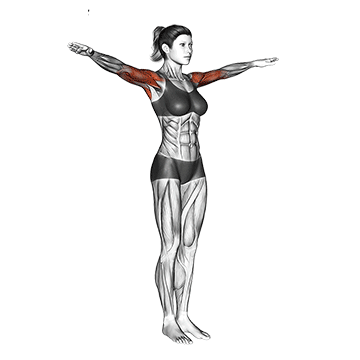
How To Do
- Stand with your arms stretched out parallel to the floor and make small, controlled circles with them as if you’re drawing circles in the air.
- Do 20 reps per arm, switching directions every 10.
- You can make your circles bigger as you progress and increase the repetitions for an added challenge.
6. Knee Diamond Push-Up
The knee diamond push-up is a fantastic stepping-stone exercise for building the strength to perform a full diamond push-up. It’s a great way to strengthen your triceps and upper body at home.
Because the knee diamond push-up is less demanding than the full diamond push-up, it can be a safer option for those new to push-ups or recovering from injuries.
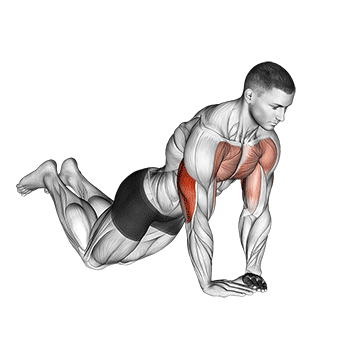
How To Do
- Take a push-up position, supporting your body on your hands and knees instead of on your hands and forefeet.
- Your thumbs and index fingers should be positioned in a diamond shape to form a diamond shape.
- Keep your body straight and keep your elbows close to your body. Inhale as you lower your chest to the floor.
- Exhale as you extend your elbows and push your body back up to the starting position.
7. Bodyweight Bicep Curl
The bodyweight bicep curl is a very effective bodyweight isolation exercise for building muscle and strength. It can be performed with higher repetitions than weighted curls, which help build muscle endurance.
Sometimes we don’t have access to equipment, but that’s not an issue with the bicep leg curl, as you only need your arms and legs.
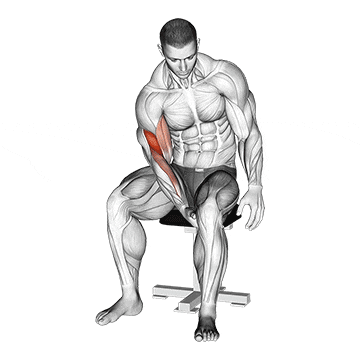
How To Do
- Sitting on a chair as close to the edge as possible. Then, place your right hand under your left thigh at the crease between your hamstrings and calves.
- Slowly curl your right up as high as you can. Hold for a couple of seconds.
- Then, slowly lower your leg back down, so your foot is just above the ground.
- Repeat for the desired number of reps. Repeat the exercise with your left arm.
Read More: Bodyweight Biceps Exercises At Home To Bigger Arm
8. Step-Ups
Step-ups are great for targeting your legs, especially your quadriceps and glutes. They can be done with or without weights.
The exercise can be modified to provide a safe and effective workout for people of all fitness levels, fitting into most exercise routines designed to boost strength.
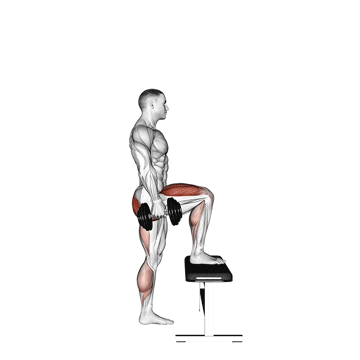
How To Do
- Stand in front of a bench or step that is about knee height.
- Place one foot on the bench and press through your heel to lift yourself up onto the bench.
- Step back down with the same foot, keeping your weight balanced on your other foot.
- Repeat before switching to the other leg.
- You can hold a weight or a filled backpack on your shoulder while doing step-ups to increase difficulty.
9. Bodyweight Standing Calf Raise
Standing calf raises (also known as heel raises) are a classic move. Even bodyweight calf exercises are an effective way of strengthening your calves because the calf muscles take on so much of your bodyweight.
They only use body weight, so they’re a really convenient calf exercise that you can do at home or pretty much anywhere.
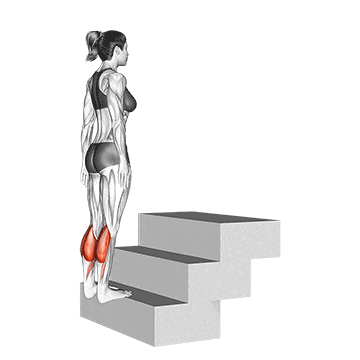
How To Do
- Stand up straight with your feet facing forward and placed hip-width apart. Keep a slight bend in your knee and hold your hands by your side.
- Raise your heels by pressing the balls of your feet into the ground.
- You should move your body upwards until you’re standing on your toes.
- Hold this position and then slowly lower your heels back to the ground.
10. Glute Bridges
The glute bridge is among the most popular core exercises. It’s a good starting move for strengthening the glutes, quads, hamstrings, and lower back muscles.
By strengthening the muscles that support the spine and pelvis, glute bridges can help correct poor posture.
You could also modify it to increase or decrease the difficulty by adding a single-leg variation or incorporating resistance bands.
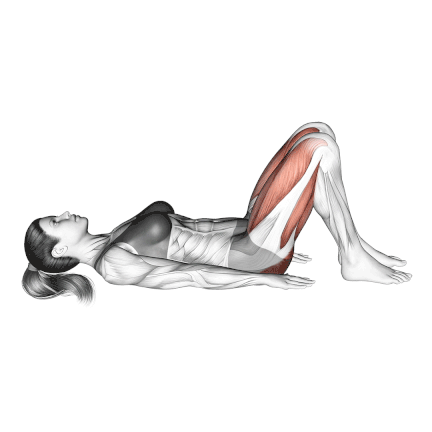
How To Do
- Face up on the floor, with your knees bent and feet flat on the ground.
- Keep your arms at your side with your palms down.
- Lift your hips off the ground until your knees and shoulders form a straight line.
- Squeeze those glutes hard and keep your abs drawn in, so you don’t overextend your back during the exercise.
- Hold your bridged position for a couple of seconds before keeping back down.
Read More: Best Bodyweight Leg Exercises That You Can Do Anywhere
11. Planks
The plank is a brilliant bodyweight exercise that helps you to develop the strength and stability of your core as well as other muscles in your body such as your back, shoulders, and legs.
The plank is primarily a strength-building exercise rather than a cardio exercise. It can also help you burn calories.
There are many ways to do the plank, such as on the forearm, on one side, or in reverse condition.
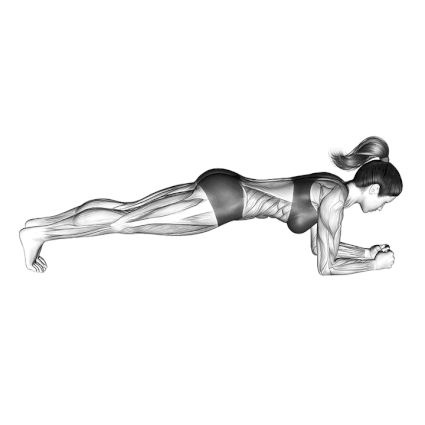
How To Do
- Start in a push-up position, with your hands shoulder-width apart and your body in a straight line.
- Your wrists should be directly under your shoulders, and your feet should be hip-width apart.
- Engage your core and glutes to keep your body in a straight line. Your head, shoulders, hips, knees, and ankles should be aligned.
- Hold this position for 30-60 seconds.
- If you’re new to planks, you may want to start with shorter holds and work your way up to longer holds.
- Repeat the plank for several sets, or work up to holding the plank for one minute.
Know More: Plank Exercise: Benefits, Variations, Muscles worked, Tips
12. Russian Twists
Russian twists are a great exercise to strengthen your core. This move works your obliques while also targeting your shoulders and hips.
For more advanced way of doing the Russian twist is to raise your feet off the floor and use a weighted twist.
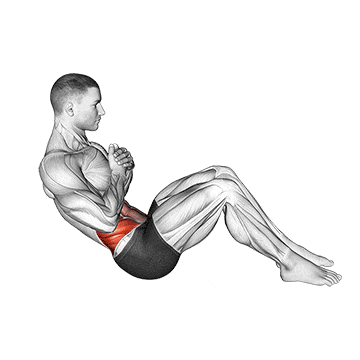
How To Do
- Sit on the floor with your knees bent and your feet flat. Lean back slightly and lift your feet off the ground.
- Hold a weight (such as a dumbbell, kettlebell, or a can of soup) or a pillow with both hands and twist your torso to the right, bringing the weight towards the floor beside your hip.
- Then, twist your torso to the left and repeat on the other side.
- Make sure to twist from your torso and not from your arms.
- Repeat the twists for several sets, aiming for 10–15 reps on each side.
Beginner At-Home Workout Routines
We have a beginner-friendly home workout plan for you.
This at-home routine includes various bodyweight exercises to help you start your fitness journey without fancy equipment.
Upper Body
| Exercise | Sets | Reps | Rest (in seconds) |
|---|---|---|---|
| Knee Push-ups | 3 | 8-10 | 60 |
| Chair Dips | 3 | 8-10 | 60 |
| Knee Plank | 3 | 20 sec | 30 |
| Superman | 3 | 8-10 | 60 |
| Russian twists | 3 | 8-10 | 60 |
Lower Body
| Exercise | Sets | Reps | Rest (in seconds) |
|---|---|---|---|
| Squats | 3 | 10-12 | 60 |
| Lunges | 3 | 10/leg | 60 |
| Glute Bridges | 3 | 10-12 | 60 |
| Calf Raises | 3 | 12-15 | 60 |
Full Body
| Exercise | Sets | Reps | Rest (in seconds) |
|---|---|---|---|
| Knee Push ups | 3 | 10-12 | 60-90 |
| Step Ups | 3-4 | 8-10 | 60-90 |
| Shoulder circles | 3 | 10-12 | 60 |
| Plank | 3 | 20-30 sec | 60 |
| Bird Dog | 3 | 10-12 | 60 |
| knee Diamond Push up | 3 | 8-10 | 60 |
Read More: Best Core Exercises For Men To Get Rock Solid Abs
Advance Bodyweight Workout At Home
You can do many advanced bodyweight exercises at home to lose fat and build strength, improve cardiovascular fitness, and increase flexibility.
13. Incline Push-Up
The incline push up is a variation of the push up where you push yourself off from a raised object instead of the ground.
It offers numerous benefits and perfectly suits beginners and experienced athletes looking to build upper body strength.
You can also use objects like a chair, a gym bench, a sofa, a box, a sturdy table, or anything else.
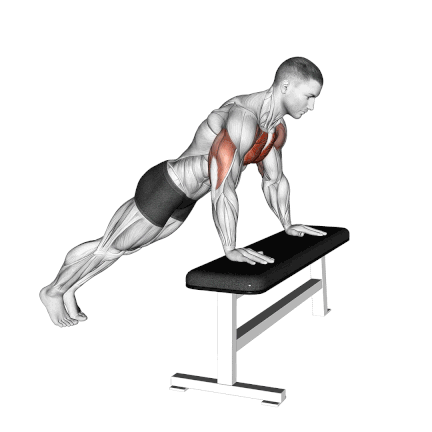
How To Do
- Stand approximately 3 to 3.5 feet away from a low bench or sturdy chair.
- Reach forward and grab the sides of the chair or bench, keeping your feet in contact with the floor.
- Slowly lower yourself by flexing your elbows so that your chest comes within a few inches of the edge of the chair or bench.
- Now, push yourself back to the starting position.
14. Standard Push-Ups
Push-ups can be performed regardless of where you are, and, best of all, they are completely free—no expensive equipment or annual gym fees required. There are different types of push-up variations to meet different needs.
The classic push-up has survived the test of time and is the single most efficient exercise for simultaneously strengthening the chest, arms, deltoid, lower back, abs, and glutes.
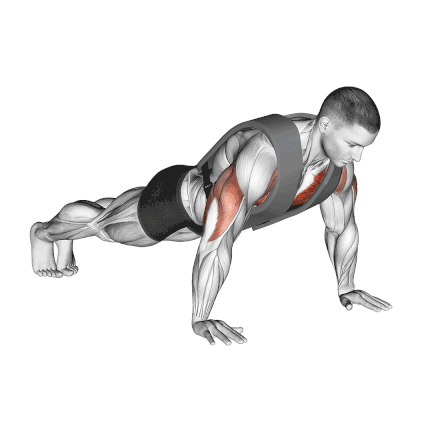
How To Do
- Start in a plank position with your hands shoulder-width apart and your body in a straight line from head to heels.
- Lower your body until your chest touches the ground,
- Then, push back to the starting position again.
Read More: Bodyweight Chest Exercises: Beginner To Advance
15. Inverted Row
Do you want to get stronger in your back, shoulders, and arms but don’t want to do a vertical pullup? Consider the “down under” version, the Australian pullup, or inverted row.
The inverted row (bodyweight rows) creates a horizontal body position, making it easier to perform. It works the back and shoulder muscles from a different angle and improves upper body strength.
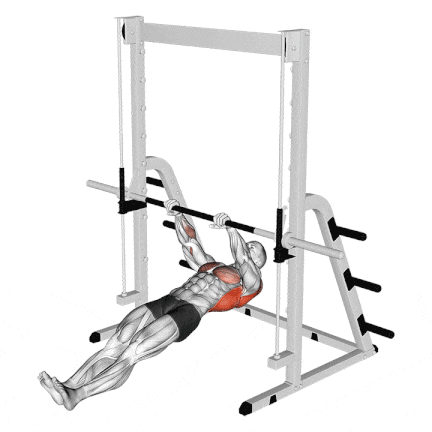
How To Do
- Adjust the height of the chair and bar so that it’s a little higher than arm’s length from the floor.
- Lie under the bar with your legs and body straight. Grasp the bar with an overhand grip that’s a little wider than shoulder width.
- Keeping your legs and body straight, exhale as you pull your chest up to the bar.
- Hold for a count of two and squeeze your back muscles.
- Breathe in as you lower your body until your arms and shoulders are fully extended. Repeat.
16. Pull-Up
The pull-up is an upper-body strength movement that targets your back, chest, shoulders, and arms. It increases the strength, thickness, and width of your back, specifically your lats.
Whether you’re a beginner or an advanced fitness enthusiast, pull-ups and chin-ups are a must-have in your exercise routine.
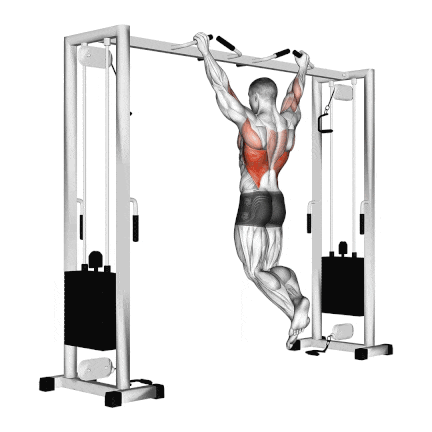
How To Do
- Grab a pull-up bar with your hands shoulder-width apart, using an overhand grip.
- Hang from the bar with your arms fully extended and your chest high, while exaggerating the arch in your lower back.
- Pull yourself up by squeezing your shoulder blades together and contracting your lats until your chin passes the bar.
- Hold the contraction at the top for a second before slowly lowering yourself back to the starting position.
17. Shoulder Tap Push Up
It is a full-body strength move that focuses on your arms, shoulders, and chest while strengthening your core.
Once you can do at least 10 full push-ups, you should be able to start incorporating some shoulder taps into the mix.
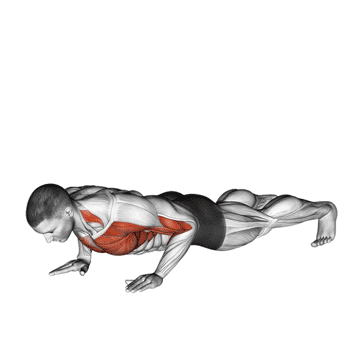
How To Do
- Start in a high plank position with your hands shoulder-width apart and your shoulders directly above your wrists.
- You can lower yourself by flexing your elbows so that your chest comes within a few inches of the floor.
- Raise your body to the starting position by pushing up with your arms.
- Tap your left hand to your right shoulder while engaging your core and glutes to keep your hips as still as possible.
- Place it back on the floor and repeat your next push-up and shoulder tap with another hand.
18. Crab Walk
The Crab Walk is an excellent full-body exercise that works the upper arms, shoulders, legs, and core. It is excellent for toning, effectively targeting all your muscle groups and working them hard to build strength.
The Crab Walk will also improve your proprioception (body awareness) by requiring you to focus on your posture, coordination, and balance.
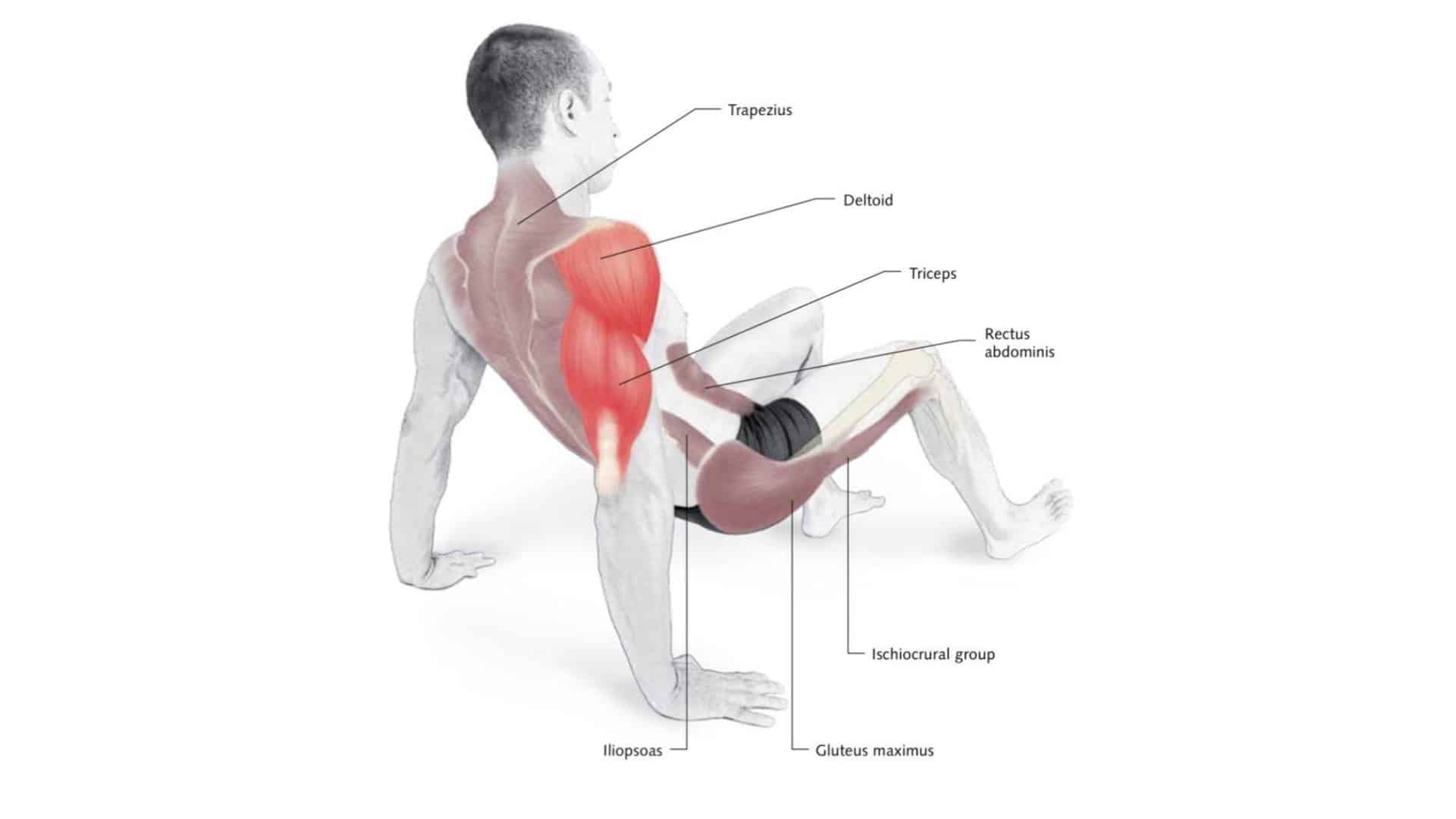
How To Do
- Position your hands and feet so that they are flat on the ground and you are face up.
- Lift your butt up off the ground by tightening your gluteal muscles.
- Begin “walking” by first moving your hands and then your feet.
- Avoid excessive shoulder strain by moving your hands no more than 6 to 8 inches at a time.
19. Pike Push Up
Pike push-ups also known as shoulder push-ups, are a variation of the push-up that increases strength and stability in the shoulders.
Doing it regularly will help develop strong core muscles and increase shoulder strength. However, pike push-up is not meant for beginners, so if you wish to start it, then progress gradually.
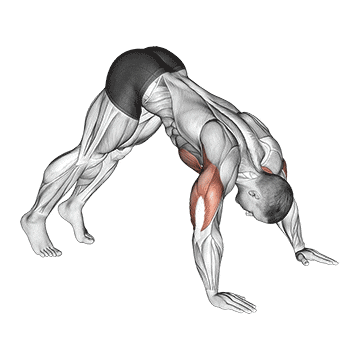
How To Do
- Start in a standard push-up position with your hands slightly wider than shoulder-width apart and elbows completely locked out.
- Lift the hips up and back until your body forms an inverted V shape. Keep arms and legs as straight as possible.
- Slowly lower the top of your head towards the ground. Once your head is about to contact the ground, pause for a second.
- Then slowly push back until your arms are straight and you’re in the inverted V position.
Read More: 21 Bodyweight Shoulder Exercises: Beginner To Advance
20. Reverse Grip Push-Ups
The reverse grip push-up is a fun and great variation of the standard push-up.
The exercise is done with your fingers facing your feet (your palms outward). Many consider it the “bicep push-up” because the hand position emphasizes your biceps more than the standard push-up.
For easier variation, you can do the Reverse Grip Push-Ups on the knee or the incline surface.
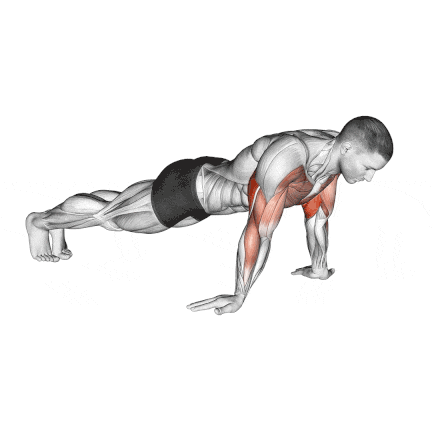
How To Do
- Start in a standard push-up position. Place your hands slightly wider than your shoulders, palms flat on the floor, and fingers pointing towards your feet.
- Inhale and slowly start to bend your elbows. Do not let your elbows move outwards (away from your body).
- Lower yourself until you are about an inch from the floor. Pause the movement when you are at the bottom for a second.
- Exhale and start pushing your body back up. Push through your palms like you would try to push the floor away from yourself.
21. Bench Dip
Bench dips are a simple exercise that can be done almost anywhere. They have many variations to match your fitness level. You could also use them as a strength workout for your upper body.
The tricep bench dip is one of the best bodyweight exercises, but be cautious: Due to shoulder internal rotation, it can put your shoulder in a dangerous position.
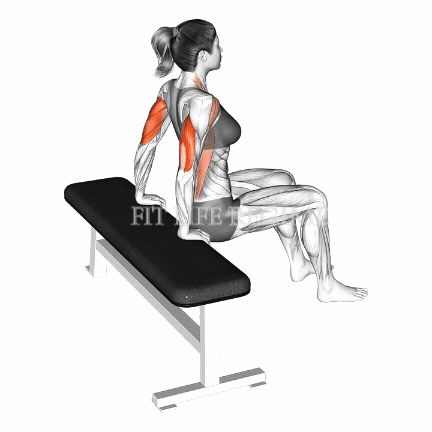
How To Do
- Place your hands on the side of a flat bench so that your body is perpendicular to the bench when you place your feet out in front of you.
- Only your heels should be on the floor and your legs should be straight. Keep your knees and hips bent.
- Your arms should be fully extended with just your palms on the bench.
- Bend your elbows to lower your body down until your elbows reach 90 degrees.
- Extend your arms to return to the starting position.
22. Bodyweight Squat
Squatting is a fundamental human movement pattern used in daily activities like sitting down, getting up from a chair, and climbing stairs.
Regularly performing bodyweight squats improves your form and efficiency in these everyday movements.
Beginners need to learn the bodyweight squat before progressing to weighted squats. This will teach you the correct technique with a safe load.
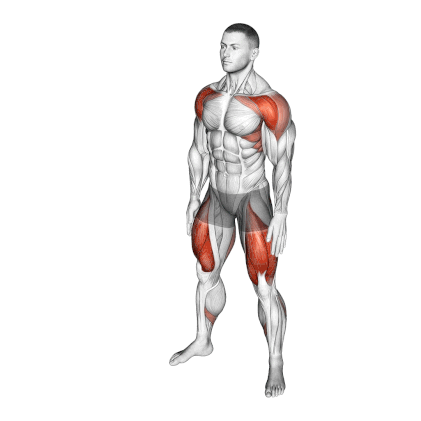
How To Do
- Stand with your feet hip-width apart, with your toes pointing forward.
- Keep your chest u,and shoulders back, and engage your core.
- Slowly lower your body by bending your knees, as if you were sitting back into a chair.
- Keep your back straight and your knees aligned with your toes.
- Lower your body as far as you can without letting your heels come off the ground or your knees to go over your toes.
- Push through your heels to return to the starting position.
23. Bodyweight Lunges
Bodyweight lunges are a compound exercise that works for multiple muscle groups simultaneously. It primarily targets the quadriceps, hamstrings, glutes, and calves.
They help you develop lower body strength, power, and endurance. You can easily modify the intensity by adding weights, performing walking lunges, or incorporating plyometric variations.
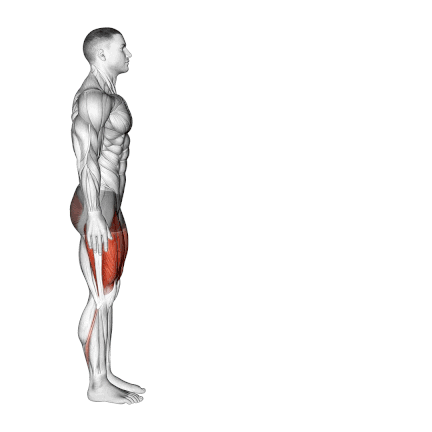
How To Do
- Stand with your feet hip-width apart, with your toes pointing forward.
- Take a large step forward with one foot, and bend your front knee until it forms a 90-degree angle.
- Make sure that your front knee is directly above your ankle and your back knee is hovering just above the ground.
- Push through your front heel to return to the starting position.
- Repeat the movement with your other leg.
24. Lying Straight Leg Raise
Lying leg raises are touted as killer core exercises. They help alleviate low back pain by improving the strength and stabilization of the core.
It also strengthens the quadriceps and hip muscles without stressing the knee joint.
Add a small cuff weight to your leg to make the straight leg raise more challenging.
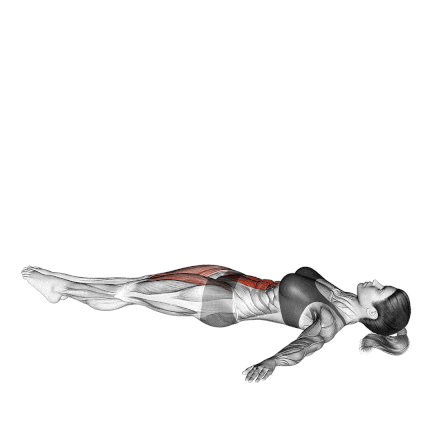
How To Do
- Lie face up on the floor/bench with your entire body straight and your hands at your sides to stabilize your torso.
- Hold your legs a few inches off the floor.
- Raise your legs up toward the ceiling until they are just short of perpendicular to the floor.
- Slowly lower your legs back to the starting position.
25. V-Up
The V-Up is a full-body move that works your core, legs, back, and shoulders. The exercise works the upper and lower abs muscles simultaneously.
Hold a weight plate or medicine ball in your hands and wear ankle weights while performing the standard V-up to make it more difficult.
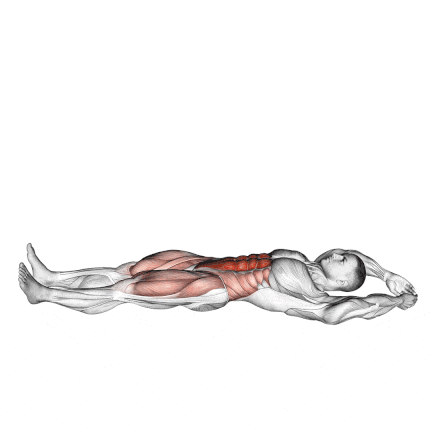
How To Do
- Lie down on the floor on your back with your arms extended straight back behind your head. Your legs should also be extended.
- Exhale and bend at your waist while raising your legs and arms to meet in a jackknife movement.
- Try to hold the contracted position.
- Lower your arms and legs back to the starting position, inhaling as you do so.
Related Post: 18 Abs Exercises You Can Do at Home Without Equipment
Advance Home Workout Routine
This at-home workout plan includes various advanced bodyweight exercises that allow you to train without any fancy gear.
Upper Body
| Exercise | Sets | Reps | Rest (in seconds) |
|---|---|---|---|
| Push-ups | 4 | 8-10 | 60 |
| Dips | 4 | 8-10 | 60 |
| Plank | 3-4 | 20 sec | 30 |
| Pull ups | 3 | 8-10 | 60 |
| Straight Leg Raise | 3 | 8-10 | 60 |
Lower Body
| Exercise | Sets | Reps | Rest (in seconds) |
|---|---|---|---|
| Jump Squats | 3-4 | 10-12 | 60 |
| Lunges | 4 | 15/leg | 60 |
| Glute Bridges | 3 | 10-12 | 60 |
| Calf Raises | 3 | 12-15 | 60 |
Full Body
| Exercise | Sets | Reps | Rest (in seconds) |
|---|---|---|---|
| Weighted Push ups | 4 | 10-12 | 60-90 |
| Jump step-ups | 3-4 | 8-10 | 60-90 |
| Chin up | 3 | 10-12 | 60 |
| Pike Push Up | 3 | 20-30 sec | 60 |
| Inverted Row | 3 | 10-12 | 60 |
| Bench Dip | 3 | 8-10 | 60 |
Resistance Band Workouts At Home
Resistance bands are a great tool for strength training at home because they are portable, inexpensive, and versatile. Below are several exercises you can do with resistance bands.
26. Resistance Band Bicep Curls
Resistance bands bicep curl keep the muscles in tension throughout the movement, leading to more bicep muscle activation. This means that you will get more out of each repetition of the bicep exercise.
It’s a versatile exercise that can be done anywhere, so it’s a good choice for working out at home or on the go.
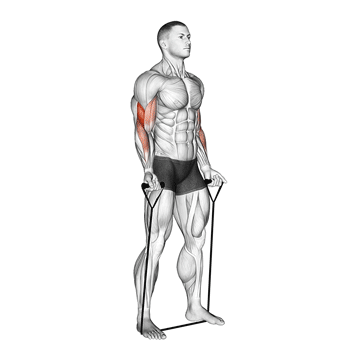
7 Best Resistance Band Bicep Exercises For Bigger Arm
27. Band Tricep Pushdown
The great news is that you can perform an effective tricep workout in the comfort of your own home with a band. Resistance band exercises like tricep pushdowns and band extensions work the tricep muscles to make them stronger and toned.
Anyone who wants to build arm mass and strength should do triceps pushdowns. They have a low impact on the elbows and shoulders and are great for keeping joints feeling healthy.
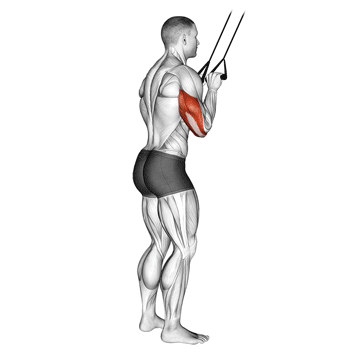
7 Best Resistance Band Tricep Exercises
28. Resistance Band Leg Extension
Resistance bands are an excellent tool for leg exercises due to their constant tension. It enhances muscle activation and necessitates the recruitment of additional leg muscles to stabilize the exercise.
Resistance band leg extensions are a great way to strengthen and tone your quadriceps muscles. This unilateral approach prevents muscle imbalances. You’ll only need a chair and a resistance band to execute this exercise.
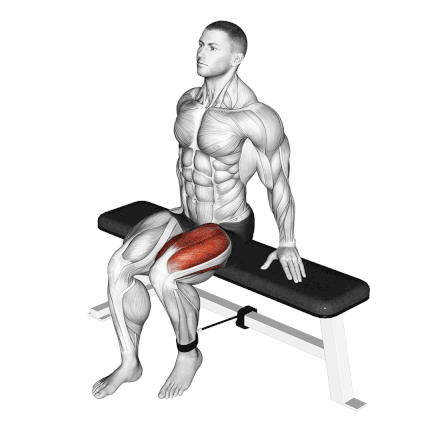
29. Resistance Band Shoulder Press
The resistance band shoulder press is an exercise that targets the shoulders’ front and side deltoid muscles. It’s like a shoulder press with free weights, but it uses a band to give you tension.
Resistance bands provide a smoother and more joint-friendly motion compared to heavier weights.
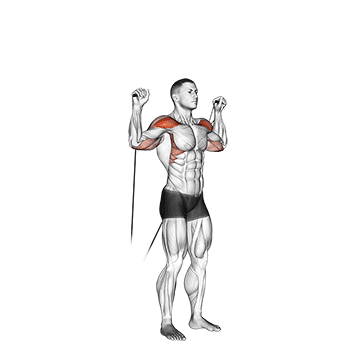
10 Best Resistance Band Shoulder Exercises
30. Resistance Band Rows
Resistance band rows are a popular back exercise that targets the muscles of the upper back, including the rhomboids, trapezius, and latissimus dorsi. They are a compound exercise that also works your arms, and core muscle.
This exercise helps to improve postural by targeting the muscles responsible for proper posture, such as the rhomboids and trapezius. It can also reduce the risk of rounded shoulders.
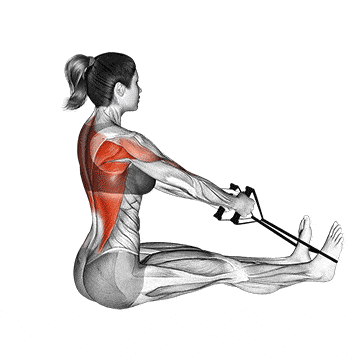
Resistance Band Home Workout Routine Plan
Upper Body
| Exercise | Sets | Reps | Rest (in seconds) |
|---|---|---|---|
| Resistance Band Bicep Curls | 3-4 | 10-12 | 60 |
| Resistance Band Overhead Press | 3 | 8-10 | 60 |
| Resistance Band Rows | 4 | 10-12 | 60 |
| Resistance Band Tricep Pushdowns | 3 | 8-10 | 60 |
Lower Body
| Exercise | Sets | Reps | Rest (in seconds) |
|---|---|---|---|
| Resistance Band Squats | 3-4 | 10-12 | 60 |
| Resistance Band Hip Thrusts | 3 | 8-10 | 60 |
| Resistance Band Lateral Walks | 3-4 | 10/leg | 60 |
| Resistance Band Standing Kickbacks | 3 | 8-10/leg | 60 |
Full Body
| Exercise | Sets | Reps | Rest (in seconds) |
|---|---|---|---|
| Resistance Band Squats | 3-4 | 10-12 | 60 |
| Resistance Band Push-ups | 4 | 8-10 | 60 |
| Resistance Band Lunges | 3 | 10/leg | 60 |
| Resistance Band Rows | 3-4 | 8-10 | 60 |
| Band Bicep Curls | 3 | 10-12 | 60 |
Cardio Workout at Home
There are many ways to get in a cardio workout at home, even without any special equipment. Here are a few examples:
1. Jumping Jacks
Jumping jacks are an efficient total-body workout that you can do almost anywhere. This exercise is part of what’s called plyometrics or jump training. Jumping jacks also involve your abdominal and shoulder muscles.
Stand with your feet together and your arms at your sides. Jump and spread your feet out to the sides while bringing your arms up above your head. Jump back to the starting position.
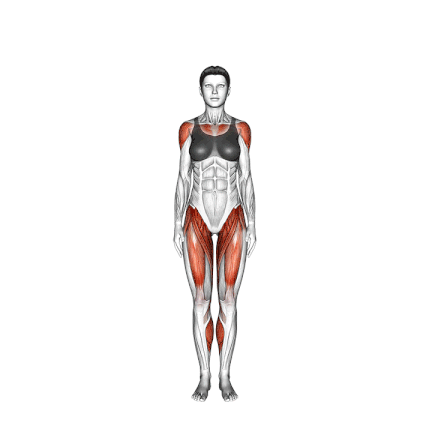
2. High Knees
High knees are an excellent bodyweight, full-body movement that increases your heart rate and warms your lower and upper body muscles.
It engages your core, strengthens all the muscles in your legs, improves momentum, coordination, and flexibility.
Stand with your feet hip-width apart and your arms at your sides. Lift your right knee towards your chest and then lower it back down. Repeat with your left knee. Continue alternating back and forth.
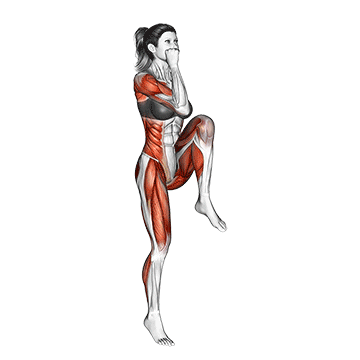
3. Mountain Climbers
While the move sounds simple, mountain climbers work your entire body and raise your heart rate. You can easily add mountain climbers to your morning workout at home or the gym, in a hotel room while you’re traveling, or even squeeze in a few in the break room at work.
Start in a plank position with your hands under your shoulders. Bring your right knee up towards your chest, then back to the starting position. Repeat with your left knee. Continue alternating back and forth.
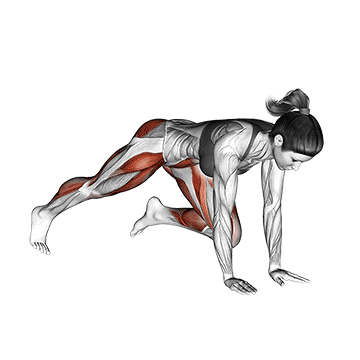
4. Burpees
Burpees are brutally efficient as a workout tool, meshing cardio and strength training into an extremely high-intensity package.
Research has shown that HIIT may be an effective way to burn body fat, especially around the abdomen and stomach.
If you want variety, it’s easy to modify the standard burpee by including weights or adding an extra pushup or jump.
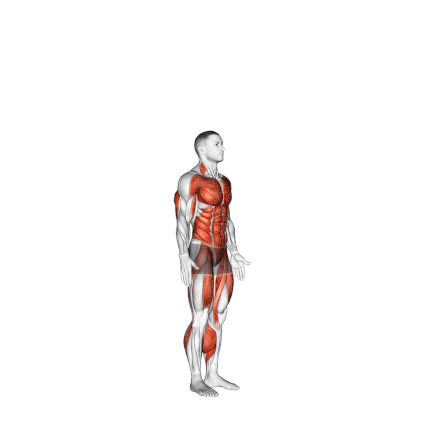
5. Jumping Rope
Jumping rope is a calorie-burning exercise that aids in weight loss and fat burning. This is a good way to lose calories and eliminate extra fat on your body.
Grab a jump rope (or pretend to jump rope with an imaginary rope) and jump over the rope as it comes towards you.
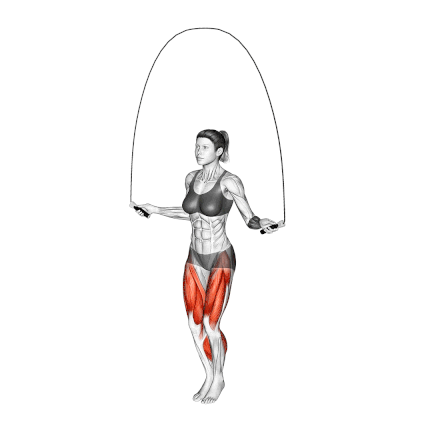
Cardio Workout Routine At Home
Here are two variations of cardio workout routines, including high-intensity interval training (HIIT), and circuit training cardio. Each routine is presented with sets, reps, rest, and other relevant information:
HIIT Cardio Workout
Do each exercise as hard as you can for a certain amount of time, then take a break for a certain amount of time. Repeat the circuit for the recommended number of sets.
| Exercise | Sets | Active Time | Rest (in seconds) |
|---|---|---|---|
| Burpees | 4 | 30 sec | 15 |
| Jumping Jacks | 4 | 30 sec | 15 |
| Mountain Climbers | 4 | 30 sec | 15 |
| High Knees | 4 | 30 sec | 15 |
Circuit Training Cardio Workout
Each exercise should be performed for the specified number of reps, with minimal rest between each exercise. Complete the circuit for the recommended number of rounds, with a longer rest period between rounds.
| Exercise | Sets | Reps |
|---|---|---|
| Jump Rope | 3 | 50 |
| Burpee | 3 | 10 |
| Bicycle Crunches | 3 | 20 |
| High Knee | 3 | 30 sec |
Yoga and Pilates Workout Routine at Home
Yoga and Pilates are both great options for a low-impact, mind-body workout at home.
I’ve included a few exercises to help you start.
1. Downward Facing Dog
Downward Facing Dog (Adho Mukha Svanasana) is the poster pose for yoga.
Downward Facing Dog stretches the hamstrings and calves, and it strengthens the arms and legs. The pose also helps increase the strength of the external oblique abdominal muscles.
Start in a plank position with your hands under your shoulders. Lift your hips up and back to form an inverted V shape. Keep your legs straight and your heels pressed towards the ground.
2. Warrior I
Stand with your feet about 3–4 feet apart and your arms at your sides. Turn your right foot out 90 degrees and your left foot out 45 degrees simultaneously. Bend your right knee until your thigh is parallel to the ground, and reach your arms up above your head.
3. Child’s pose
Begin on your hands and knees, with your wrists under your shoulders and your knees below your hips. Lower your hips back to the floor and reach your arms out in front of you.
4. The Hundred
Lie on your back with your legs bent and your arms by your sides. Lift your head, shoulders, and legs off the floor slightly. Pump your arms up and down while lifting your head and legs a few inches off the ground.
5. Single-leg circles
Lie on your back with your arms by your sides and one leg extended straight up towards the ceiling. Slowly trace circles with your extended leg, then reverse the direction. Repeat on the other side.
Yoga and Pilate Home Workout routines
Yoga and Pilates are excellent practices for improving flexibility, strength, and well-being.
Yoga Routine
You should hold each yoga pose for the recommended amount of time. You can rest between poses or after completing the full sequence.
Feel free to extend the duration or repeat the sequence to deepen your practice. Modify poses or take breaks as needed to accommodate your level of comfort and flexibility.
| Pose | Sets | Duration |
|---|---|---|
| Mountain Pose | 3 | 30 seconds |
| Downward Dog | 3 | 30 seconds |
| Warrior I | 2 | 30 seconds per side |
| Tree Pose | 3 | 30 seconds per side |
| Child’s Pose | 3 | 30 seconds |
Pilates Routine
| Exercise | Sets | Reps |
|---|---|---|
| Pilates Roll-Up | 3 | 10-12 |
| Pilates Hundred | 3 | 10-12 breaths |
| Single Leg Stretch | 3 | 10-12 reps |
| Pilates Plank | 3 | 30 seconds |
Takeaways
With bodyweight exercises, you can make your at-home workout challenging, no matter your fitness level.
If you start with the beginner routine, you could be well on your way to mastering the advanced routine in a matter of months.

Manish is a NASM-certified fitness and nutrition coach with over 10 years of experience in weight lifting and fat loss fitness coaching. He specializes in gym-based training and has a lot of knowledge about exercise, lifting technique, biomechanics, and more.
Through “Fit Life Regime,” he generously shares the insights he’s gained over a decade in the field. His goal is to equip others with the knowledge to start their own fitness journey.

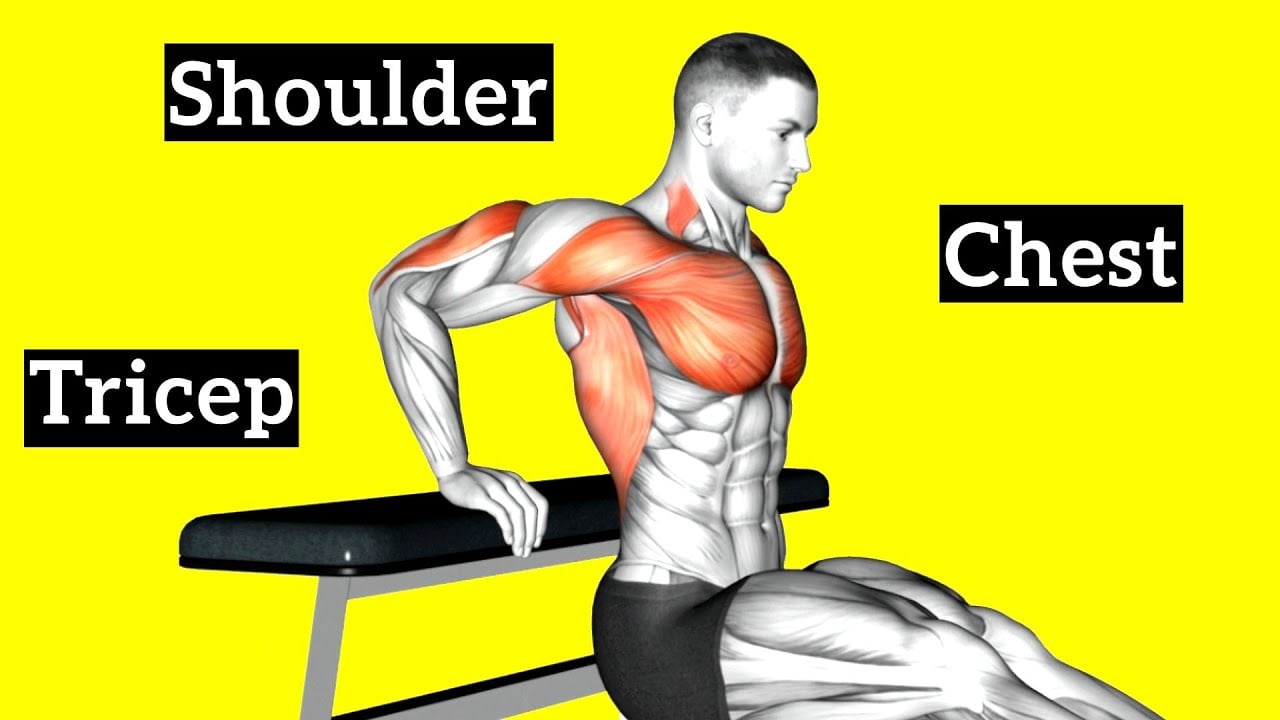
This is a great piece of writing with a lot of useful information! I really enjoyed the way the story was presented and the writing style was very engaging. I’m looking forward to reading more posts from you in the future! Cheers!
I’ve found that home workouts are a great way to stay active, even on busy days. Short sessions with bodyweight exercises, resistance bands, or yoga flows make me feel energized without leaving the house